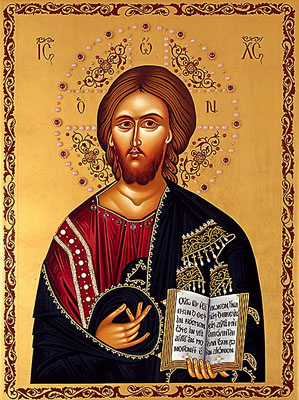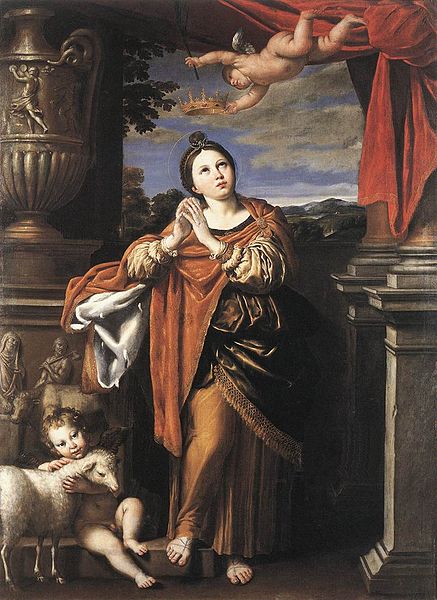Saint Agnes, Virgin, Martyr on Friday of week 2 in Ordinary Time  Saint Agnes Church, Manhattan, New York Readings at MassLiturgical Colour: Red. These are the readings for the feria
I will not raise my hand against the Lord's anointedSaul took three thousand men chosen from the whole of Israel and went in search of David and his men east of the Rocks of the Wild Goats. He came to the sheepfolds along the route where there was a cave, and went in to cover his feet. Now David and his men were sitting in the recesses of the cave; David’s men said to him, ‘Today is the day of which the Lord said to you, “I will deliver your enemy into your power, do what you like with him.”’ David stood up and, unobserved, cut off the border of Saul’s cloak. Afterwards David reproached himself for having cut off the border of Saul’s cloak. He said to his men, ‘The Lord preserve me from doing such a thing to my lord and raising my hand against him, for he is the anointed of the Lord.’ David gave his men strict instructions, forbidding them to attack Saul. Saul then left the cave and went on his way. After this, David too left the cave and called after Saul, ‘My lord king!’ Saul looked behind him and David bowed to the ground and did homage. Then David said to Saul, ‘Why do you listen to the men who say to you, “David means to harm you”? Why, your own eyes have seen today how the Lord put you in my power in the cave and how I refused to kill you, but spared you. “I will not raise my hand against my lord,” I said “for he is the anointed of the Lord.” O my father, see, look at the border of your cloak in my hand. Since I cut off the border of your cloak, yet did not kill you, you must acknowledge frankly that there is neither malice nor treason in my mind. I have not offended against you, yet you hunt me down to take my life. May the Lord be judge between me and you, and may the Lord avenge me on you; but my hand shall not be laid on you. (As the old proverb says: Wickedness goes out from the wicked, and my hand will not be laid on you.) On whose trail has the king of Israel set out? On whose trail are you in hot pursuit? On the trail of a dead dog! On the trail of a single flea! May the Lord be the judge and decide between me and you; may he take up my cause and defend it and give judgement for me, freeing me from your power.’ When David had finished saying these words to Saul, Saul said, ‘Is that your voice, my son David?’ And Saul wept aloud. ‘You are a more upright man than I,’ he said to David ‘for you have repaid me with good while I have repaid you with evil. Today you have crowned your goodness towards me since the Lord had put me in your power yet you did not kill me. When a man comes on his enemy, does he let him go unmolested? May the Lord reward you for the goodness you have shown me today. Now I know you will indeed reign and that the sovereignty in Israel will be secure in your hands.’
Have mercy on me, God, have mercy. Have mercy on me, God, have mercy for in you my soul has taken refuge. In the shadow of your wings I take refuge till the storms of destruction pass by. Have mercy on me, God, have mercy. I call to God the Most High, to God who has always been my help. May he send from heaven and save me and shame those who assail me. Have mercy on me, God, have mercy. O God, arise above the heavens; may your glory shine on earth! for your love reaches to the heavens and your truth to the skies. Have mercy on me, God, have mercy.
Alleluia, alleluia! Through the Good News God called us to share the glory of our Lord Jesus Christ. Alleluia!
Alleluia, alleluia! God in Christ was reconciling the world to himself, and he has entrusted to us the news that they are reconciled. Alleluia!
He appointed twelve to be his companionsJesus went up into the hills and summoned those he wanted. So they came to him and he appointed twelve; they were to be his companions and to be sent out to preach, with power to cast out devils. And so he appointed the Twelve: Simon to whom he gave the name Peter, James the son of Zebedee and John the brother of James, to whom he gave the name Boanerges or ‘Sons of Thunder’; then Andrew, Philip, Bartholomew, Matthew, Thomas, James the son of Alphaeus, Thaddaeus, Simon the Zealot and Judas Iscariot, the man who was to betray him. These are the readings for the memorial
God chose what is foolish by human reckoning, to shame the wiseTake yourselves for instance, brothers, at the time when you were called: how many of you were wise in the ordinary sense of the word, how many were influential people, or came from noble families? No, it was to shame the wise that God chose what is foolish by human reckoning, and to shame what is strong that he chose what is weak by human reckoning; those whom the world thinks common and contemptible are the ones that God has chosen – those who are nothing at all to show up those who are everything. The human race has nothing to boast about to God, but you, God has made members of Christ Jesus and by God’s doing he has become our wisdom, and our virtue, and our holiness, and our freedom. As scripture says: if anyone wants to boast, let him boast about the Lord.
The Lord is my shepherd: there is nothing I shall want. The Lord is my shepherd; there is nothing I shall want. Fresh and green are the pastures where he gives me repose. Near restful waters he leads me, to revive my drooping spirit. The Lord is my shepherd: there is nothing I shall want. He guides me along the right path; he is true to his name. If I should walk in the valley of darkness no evil would I fear. You are there with your crook and your staff; with these you give me comfort. The Lord is my shepherd: there is nothing I shall want. You have prepared a banquet for me in the sight of my foes. My head you have anointed with oil; my cup is overflowing. The Lord is my shepherd: there is nothing I shall want. Surely goodness and kindness shall follow me all the days of my life. In the Lord’s own house shall I dwell for ever and ever. The Lord is my shepherd: there is nothing I shall want.
Alleluia, alleluia! Remain in my love, says the Lord; whoever remains in me, with me in him, bears fruit in plenty. Alleluia!
He sells everything he owns and buys the fieldJesus said to the crowds: ‘The kingdom of heaven is like treasure hidden in a field which someone has found; he hides it again, goes off happy, sells everything he owns and buys the field. ‘Again, the kingdom of heaven is like a merchant looking for fine pearls; when he finds one of great value he goes and sells everything he owns and buys it.’ The readings on this page are from the Jerusalem Bible, which is used at Mass in most of the English-speaking world. The New American Bible readings, which are used at Mass in the United States, are available in the Universalis apps, programs and downloads. |



